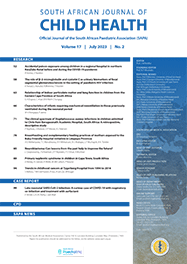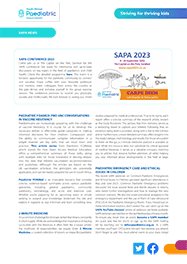Research

Workplace support for breastfeeding employees in educational and healthcare settings in Ghana
Abstract
Background. Maternal employment outside the home is associated with shorter breastfeeding duration among full-time working mothers. However, few studies have explored breastfeeding practices among working mothers in the context of less-developed countries, where an increasing number of women are entering the labour force as full-time workers.
Objectives. To assess the nature of existing support systems and the needs of breastfeeding working mothers in Ghana.
Methods. A descriptive cross-sectional study design was used. Convenience sampling was used to recruit participants (N=128) from 15 healthcare and 12 educational institutions (n=27) to complete a self-administered questionnaire. The data analysis employed descriptive statistics to analyse both the demographic and the main study variables.
Results. The mean breastfeeding support score for both workplaces was nearly identical: 1.44 for healthcare institutions and 1.30 for educational institutions. With the exceptions of peer support and breastfeeding breaks, which were found to be common forms of support for breastfeeding employees, there was an evident lack of support systems to promote workplace breastfeeding. An increase in maternity leave from 3 months to 6 months, a private designated space for breastfeeding and a workplace crèche were found to be the greatest needs expressed by working mothers in Ghana.
Conclusion. There is a lack of targeted interventions to promote optimal breastfeeding practices among working mothers. Policy interventions should address the identified support needs of working mothers through the provision of private breastfeeding rooms, workplace crèches and an increase in maternity leave from 3 to 6 months.
Authors' affiliations
S Iddrisu, Centre for Development and Policy Advocacy, Tamale, Northern Region, Ghana
A Abdul-Lateef, Centre for Development and Policy Advocacy, Tamale, Northern Region, Ghana
M Hushie, Department of Behavioural Sciences, School of Allied Health Sciences, University for Development Studies, Tamale, Northern Region, Ghana
A Bashiru, Evangelical Presbyterian College of Education, Bimbila, Northern Region, Ghana
Full Text
Cite this article
Article History
Date published: 2019-12-17
Article Views
Full text views: 1139

.jpg)



Comments on this article
*Read our policy for posting comments here